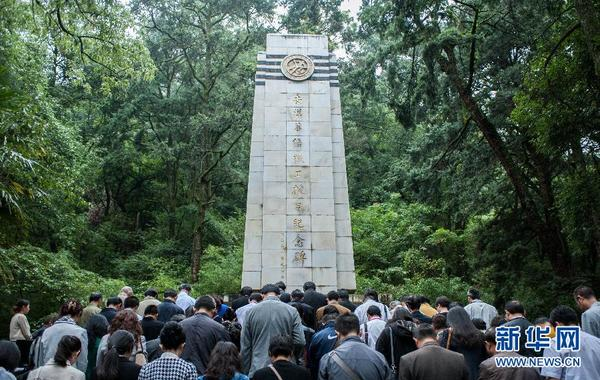
By Yu Wei and Wang Dawei
KUALA LUMPUR, April 4(ChinaMil) — On April 3rd, on the eve of the Chinese traditional Tomb-Sweeping Day, a joint ceremony was held in front of the Memorial Monument to Nanyang (Southeast Asia) Chinese Drivers and Mechanics in Negeri Selangor, Malaysia. Attendees from China and Malaysia mourned those heroic martyrs and made calls for world peace and prosperity.
When addressing the ceremony, Nga Kor Ming, Deputy Speaker of Dewan Rakyat of the Parliament of Malaysia, said that his grandfather was one of the Chinese drivers and mechanics from Nanyang who had volunteered to serve in China during the Chinese People’s War of Resistance against Japanese Aggression. They and other overseas Chinese came back to China, the motherland, to resist Japanese invaders at the cost of their lives. Their patriotic spirit is admirable, Nga Kor Ming added.
Chinese Ambassador to Malaysia Bai Tian said that on the 80th anniversary of the epic event of the Nanyang Volunteer Drivers and Mechanics, we held this ceremony not only to honor those martyrs and admire their ineffaceable feats in history, but also to show the world our sincere aspirations for peace.
Ambassador Bai also noted that China is a firm advocate and strong defender of world peace. The Chinese people will unwaveringly safeguard the lofty undertaking of human peace and development and are willing to work together with people from countries around the world including Malaysia to contribute to building a world of lasting peace and common prosperity.
More than 100 people, including representatives of Chinese enterprises and students in Malaysia, attended the ceremony.
In July 1937, after the onset of the Chinese People’s War of Resistance against Japanese Aggression, China’s most major coastal ports were occupied by Japanese troops, resulting in an interruption of the sea transportation of military aid supplies from abroad. The Burma Road, newly opened in January 1939, became the only international route for China’s rear areas to connect with the outside world.
Back then, China extremely lacked drivers and mechanics. Starting in February 1939, under the call of Tan Kah Kee, a renowned patriotic leader of overseas Chinese and president of the Tan Kah Kee Foundation, countless young overseas Chinese in Southeast Asia volunteered to work as truck drivers and mechanics. They formed the Nanyang Service Group of Returned Overseas Chinese Drivers and Mechanics and returned to China in groups during the war, until May 1942 when the transportation along the Burma Road was also cut off.









